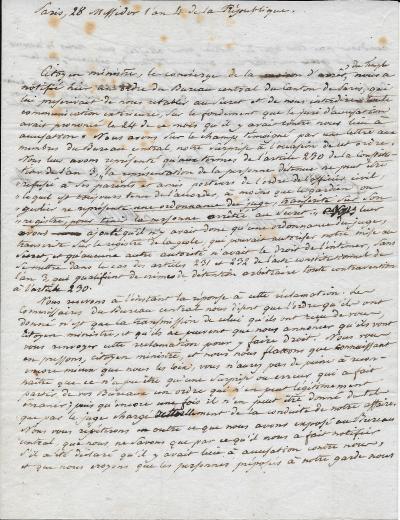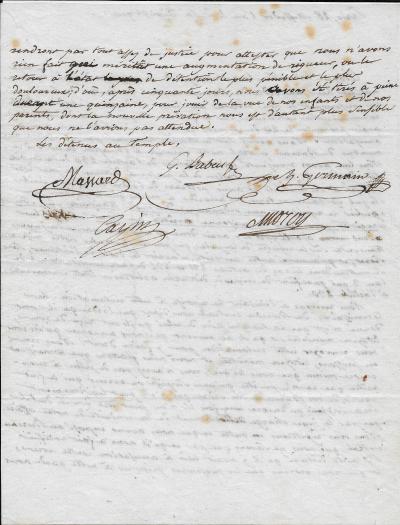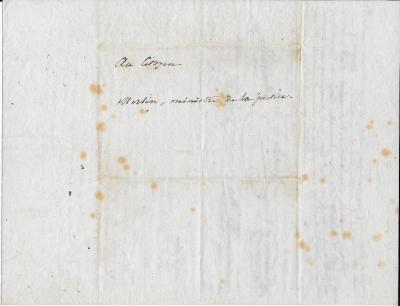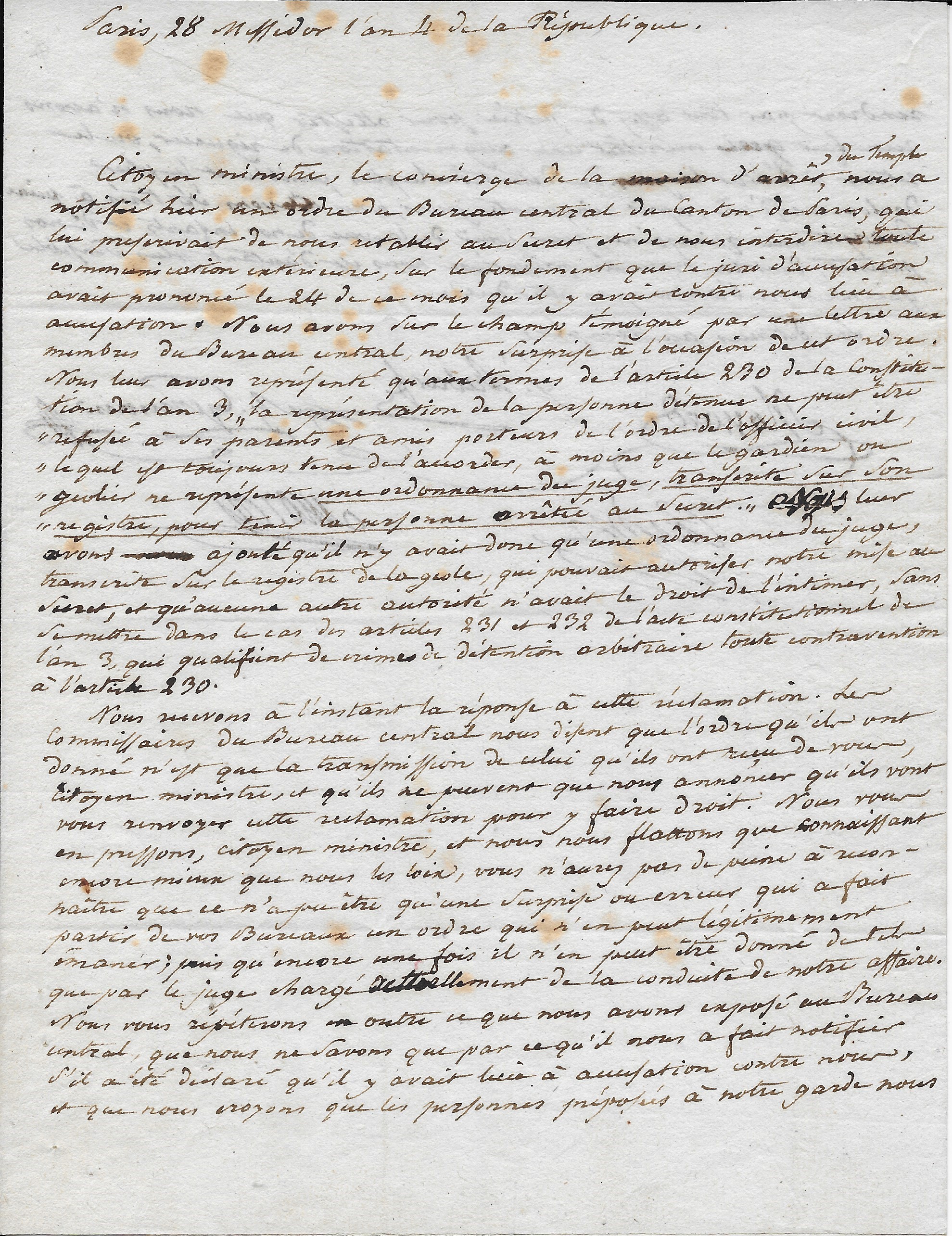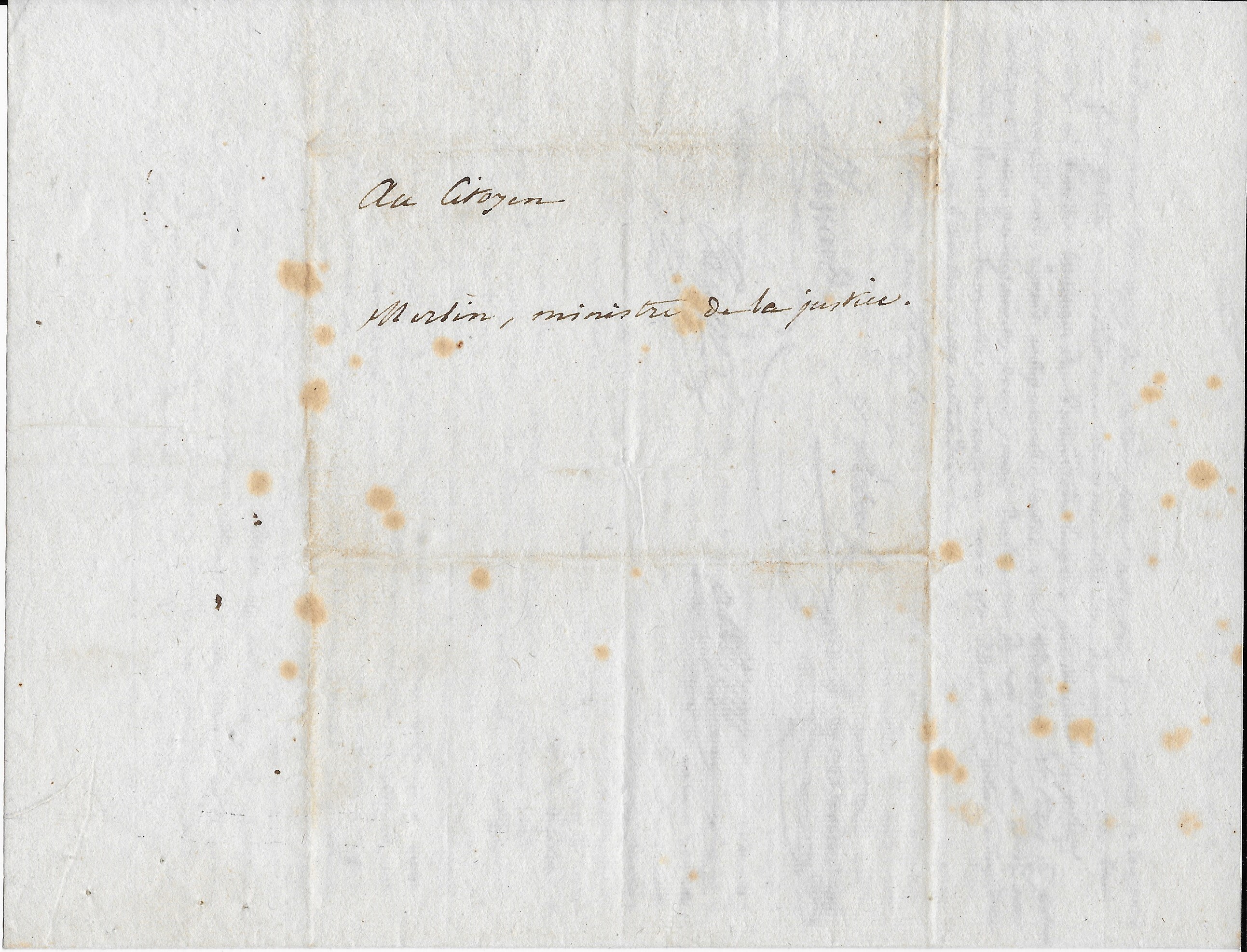Gracchus BABEUF - Signed autograph letter
Gracchus BABEUF (1760 - 1797), French revolutionary
Autograph letter signed and co-signed by Germain, Cazin, Moroy, Massard, members of the Conjuration des Equaux, to the Minister of Justice of the Directory, Merlin de Douai. Paris, 28 Messidor, year 4 of the Republic (July 16, 1796); 2 pages in-8 °, recipient's address on the fourth page. A few scattered light rednesses.
Beautiful letter rich in content on the difficult conditions of detention of Babeuf and his accomplices, following their arrest on denunciation on May 10, 1796. He will be executed a year later on May 27, 1797:
"Citizen Minister. The concierge of the Temple remand prison notified us yesterday of an order from the central office of the Canton of Paris, which ordered him to reestablish us in secrecy and to prohibit us from any external communication, on the basis that the prosecution jury had pronounced on the 24th of this month that there were grounds for accusation against us. We immediately testified by a letter to the members of the Central Office, our surprise on the occasion of this order. We represented to him that at the end of article 230 of the Constitution of year 3, the representation of the detained person cannot be refused to his relatives and friends carrying the order of the civil officer, which is always required to grant it, unless the guard or jailer represents an order of the judge, transcribed in his register, to keep the arrested person incommunicado. We added to them that there was therefore only an order of the judge, transcribed in the jail register, which could authorize our confinement, and that no other authority had the right to intimidate it. , without putting ourselves in the case of articles 231 and 232 of the constitutional act of year 3, which qualify as a crime of arbitrary detention any contravention of article 230. We are now following the response to this complaint. The commissioners of the Central Office tell us that the order they gave is only the transmission of the one they received from you, citizen minister, and that they can only tell us that they are going to send us back this claim to make it right. We urge you, Citizen Minister, and we flatter ourselves that knowing the laws even better than we do, you will have no difficulty in recognizing that it could only have been a surprise or error which made you leave your Offices. an order which does not legitimately emanate from it, then that once again it can only be given by the judge currently in charge of the conduct of our case. We will repeat to you in addition to what we have explained to the Central Office, that we only know from what it has notified us whether it has been declared that there is grounds for accusation against us, and that we believe that the those in charge of our custody will do us enough justice to attest that we have done nothing that deserves a rigorous increase, or a return to the most painful and painful state of detention; whence, after fifty days, we were drawn barely a fortnight to enjoy the sight of our children and our parents, whose new deprivation is all the more noticeable to us as we had not expected it. The prisoners at the Temple (…) "
The letters of Gracchus Babeuf are extremely rare
Having to work underground, following the promulgation of his theses in favor of equality and the collectivization of land, which were not to the liking of the conventional, he found himself imprisoned for the first time in Arras, on 19 Pluviôse year III. , but regains freedom, thanks to an amnesty law passed on 26 Vendémiaire Year IV. The repression, which resulted in particular in the closure of the Jacobin club, forced him to act underground by creating, with his accomplices, The Conjuration of Equals, made up of a directory of which he took charge. Its action aims to apply the Constitution of year I, made up of a declaration of the rights of man and of the citizen supplementing and replacing that of 1789, never applied by Robespierre, and to lead to the collectivization of land and means of production, to obtain "perfect equality" and "common happiness". Hunted by Azar Carnot, member of the Directory, Babeuf and his accomplices are denounced by an informer. They were imprisoned in the Temple prison on May 10, 1796. After two attempts by his supporters for their release, aborted, they were transferred to the Vendôme prison, far from Paris, to be tried there. In this letter of July 16, 1796, Babeuf asks for clemency from the Minister of Justice, Merlin de Douai, who, in the face of popular repression by his supporters, tightened the conditions of detention. Babeuf asks him for the right to see his family, in accordance with article 230 of the Constitution of year 3, implicitly reminding him that the constitution of year I had never been applied by the Robespierrists. The trial opens in Vendôme on February 20, 1797 and ends on May 26. On the announcement of his death sentence, Babeuf attempts to commit suicide. He was guillotined, dying, the day after his sentence.
Autograph letter signed and co-signed by Germain, Cazin, Moroy, Massard, members of the Conjuration des Equaux, to the Minister of Justice of the Directory, Merlin de Douai. Paris, 28 Messidor, year 4 of the Republic (July 16, 1796); 2 pages in-8 °, recipient's address on the fourth page. A few scattered light rednesses.
Beautiful letter rich in content on the difficult conditions of detention of Babeuf and his accomplices, following their arrest on denunciation on May 10, 1796. He will be executed a year later on May 27, 1797:
"Citizen Minister. The concierge of the Temple remand prison notified us yesterday of an order from the central office of the Canton of Paris, which ordered him to reestablish us in secrecy and to prohibit us from any external communication, on the basis that the prosecution jury had pronounced on the 24th of this month that there were grounds for accusation against us. We immediately testified by a letter to the members of the Central Office, our surprise on the occasion of this order. We represented to him that at the end of article 230 of the Constitution of year 3, the representation of the detained person cannot be refused to his relatives and friends carrying the order of the civil officer, which is always required to grant it, unless the guard or jailer represents an order of the judge, transcribed in his register, to keep the arrested person incommunicado. We added to them that there was therefore only an order of the judge, transcribed in the jail register, which could authorize our confinement, and that no other authority had the right to intimidate it. , without putting ourselves in the case of articles 231 and 232 of the constitutional act of year 3, which qualify as a crime of arbitrary detention any contravention of article 230. We are now following the response to this complaint. The commissioners of the Central Office tell us that the order they gave is only the transmission of the one they received from you, citizen minister, and that they can only tell us that they are going to send us back this claim to make it right. We urge you, Citizen Minister, and we flatter ourselves that knowing the laws even better than we do, you will have no difficulty in recognizing that it could only have been a surprise or error which made you leave your Offices. an order which does not legitimately emanate from it, then that once again it can only be given by the judge currently in charge of the conduct of our case. We will repeat to you in addition to what we have explained to the Central Office, that we only know from what it has notified us whether it has been declared that there is grounds for accusation against us, and that we believe that the those in charge of our custody will do us enough justice to attest that we have done nothing that deserves a rigorous increase, or a return to the most painful and painful state of detention; whence, after fifty days, we were drawn barely a fortnight to enjoy the sight of our children and our parents, whose new deprivation is all the more noticeable to us as we had not expected it. The prisoners at the Temple (…) "
The letters of Gracchus Babeuf are extremely rare
Having to work underground, following the promulgation of his theses in favor of equality and the collectivization of land, which were not to the liking of the conventional, he found himself imprisoned for the first time in Arras, on 19 Pluviôse year III. , but regains freedom, thanks to an amnesty law passed on 26 Vendémiaire Year IV. The repression, which resulted in particular in the closure of the Jacobin club, forced him to act underground by creating, with his accomplices, The Conjuration of Equals, made up of a directory of which he took charge. Its action aims to apply the Constitution of year I, made up of a declaration of the rights of man and of the citizen supplementing and replacing that of 1789, never applied by Robespierre, and to lead to the collectivization of land and means of production, to obtain "perfect equality" and "common happiness". Hunted by Azar Carnot, member of the Directory, Babeuf and his accomplices are denounced by an informer. They were imprisoned in the Temple prison on May 10, 1796. After two attempts by his supporters for their release, aborted, they were transferred to the Vendôme prison, far from Paris, to be tried there. In this letter of July 16, 1796, Babeuf asks for clemency from the Minister of Justice, Merlin de Douai, who, in the face of popular repression by his supporters, tightened the conditions of detention. Babeuf asks him for the right to see his family, in accordance with article 230 of the Constitution of year 3, implicitly reminding him that the constitution of year I had never been applied by the Robespierrists. The trial opens in Vendôme on February 20, 1797 and ends on May 26. On the announcement of his death sentence, Babeuf attempts to commit suicide. He was guillotined, dying, the day after his sentence.
This description has been translated automatically. please click here Click here to display the original language FR
End of sale
This item is not available. Please click on « View the catalog » to see similar items available.
Delivery France:
30.00 € incl. VAT (*)
Country prices, click on See
See more
Hotline
Please contact us for any question regarding this object. For any other inquiry, we invite you to fill the contact form.
Other items from the category « Autographs »
